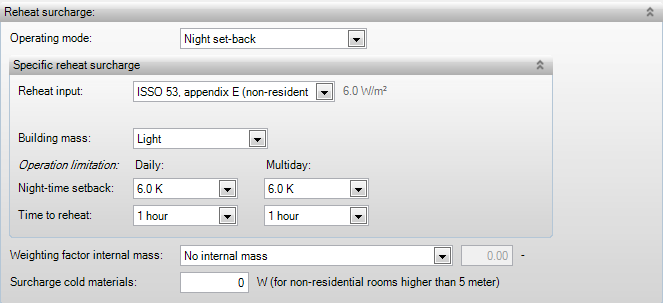

All surfaces (including furniture, and excluding windows and doors) are taken into account to compute the reheat surcharge. Covered surfaces are only counted for 70%, and non-stony surfaces are not counted.
|
HL, WB |
ISSO Publication 51 (2009), section 4.4.4 Specific allowance for business restriction P
|
|
HL, UB |
ISSO Publication 53 (2010), Annex E / ISSO Publication 57 (2003), Annex E (Determination of) Specific allowance P for company limitation
|
HL
This option indicates
whether a specific surcharge for business restriction applies:
•Continuous; the operation is continuous, which means there is no heating surcharge. Therefore no business restriction occurs and consequently no specific surcharge for heat loss either;
•Night set-back; if the operation is set to night set-back, periodically a specific surcharge for heat loss needs to be calculated, such that the building can be heated within a certain time. The night set-back can be entered using a wizard for non-residential buildings, residential buildings or using a custom value.
[Choice and W / m²] HL
The method used to calculate the specific heating
surcharge is indicated here. This input depends on the room being either
residential or non-residential. For more detailed information, please consult
Heating
surcharge.
•If the room concerns a residential area, the calculations are applied using a wizard based on on ISSO 51, section 4.4.4;
•If the room concerns a non-residential area, the calculations are applied using a wizard based on ISSO 53 Annex E;
•If a custom value is chosen, the wizard can be bypassed by entering a custom specific heat surcharge.
|
HL, WB |
ISSO Publication 51 (2009), section 4.4.4 Specific allowance for operation restriction P
|
|
HL, UB |
ISSO Publication 53 (2010), Annex E / ISSO Publication 57 (2003), Annex E (Determination of) Specific allowance P for company limitation
|
HL
If the reheat input
for non-residential input has been selected, a global average building mass is
required.
§ Light for light building masses, such as timber frame constructions
§ Medium for medium building masses, such as metal and glass
§ Heavy for heavy building masses such as concrete, masonry and other types of stone.
HL
If one of the two
wizards has been chosen in the reheat input, a night-time setback is required.
This represents the number of degrees Celsius between daytime operation and
night-time operation of the system. The night-time setback can be set daily and
multiday.
[Hours] HL
This is the time from the moment the system is
activated after a period of reduced operation until the temperature
corresponding to PMV = -0.5 is achieved. The time to reheat is defined in design
conditions.
[Choice and factor] HL
The internal mass weighting factor is specified to
take into account additional accumulating surface area due to internal mass in
Heat loss calculations. In non-residential buildings this factor is 0, except
for shopping stores, libraries, and archives. The weighting factor is multiplied
by the surface area of the floor. You can find several guideline values of the
weighting factor in the table below.
|
Definition |
cm |
|
Textile shop |
0.00 |
|
Supermarket, liquor store, pottery, etc. |
1.00 |
|
Shop for tools, metals, etc. |
1.00 |
|
Library |
0.50 |
|
Other shop types |
0.25 |
|
Archives* |
1.50 |
|
* Full climate control aimed at the preservation of stored products is often available in these areas. | |
Table12: Approximate weighting factor internal mass
|
HL, UB |
ISSO Publication 53 (2010), Section 4.4.2.1 Arrangements with non-optimizing controller, control per room
|
HL
The internal mass
(machines and products) needs to be determined in rooms with non-residential
area which are higher than 5m. Based on this internal mass and the
weighting factor, this surcharge should be specified in W.
|
|
ISSO Publication 57, Section 3.4.1.2
|